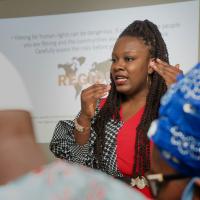The U.S. has long operated without being an inclusive economy.
It’s a fact of American life that’s most apparent in data on racial wealth gaps. In 2019, the median net worth of a white family in the U.S. was about $188,200 compared to $24,100 for Black families, according to the Survey of Consumer Finances. Two broad factors help to explain the roots of the American racial wealth: discriminatory laws and compound interest.
The U.S. has a long history of discriminatory policies that have made it difficult if not impossible for Black families to build wealth, from slavery and Jim Crow laws, to redlining and the unfair execution of the GI BIll. Although the Civil Rights movement eliminated most forms of explicitly discriminatory laws, some effects of those policies still echo across the nation today.
That’s partly due to the power of compound interest. For example, a white family who was able to secure loans to start a business and buy a house in the 1950s would have likely seen their assets and savings appreciate significantly in value over time. The family’s children would have access to generational wealth. In contrast, a Black family who was, say, denied a business loan and prevented from buying a home in a desirable location would not have had the same opportunities to start building wealth.
For subsequent generations, the lack of generational wealth likely made it harder to pay for college tuition, weather economic recessions, and access the capital necessary to start businesses. Today, Black Americans are about three times less likely to receive an inheritance than white Americans, while the amounts they do inherit are significantly less, according to the Federal Reserve.
If current trends persist, Black Americans could be on track to hit a median net worth of zero by the middle of the century.
“We’re going to become in the U.S. a majority people of color country,” Rodney Foxworth, CEO of Common Future, told Freethink. “And if we’re not investing into people of color and communities of color, if we’re not actually unlocking all the tremendous capacity and potential in those communities, then we’re all going to lose out.”
Inclusive economics
A growing number of organizations across the U.S. are working to make the traditional economy more inclusive. The general goal is to add social elements to capitalism so that it works better for groups who have been historically less able to participate in wealth-building opportunities throughout American history.
A network of entrepreneurs, advocates, and community leaders, including Common Future, MORTAR, and PolicyLink, are part of that effort to close this gap. The network works with foundations, philanthropists, and other wealth holders to strategically shift capital toward marginalized entrepreneurs and organizations.
“By bringing together Fellows, funders, and other key players in the economy, Common Future has built a unique network that is poised to learn together; forge new collaborations; provide real financial opportunities through grantmaking and capital products; and elevate this work to mainstream actors in philanthropy, investing, and policy to influence economic systems,” the Common Future website states. “As a result, $250M has been shifted out of traditional Wall Street investments and into communities, through a racial equity lens.”
Boosting Black-owned businesses
A key focus for Common Future is empowering Black-owned businesses. Black Americans currently make up about 14% of the population, but they own only about 2.2% of businesses across the country, according to data from the Census Bureau. The Black Americans who do pursue entrepreneurship generally start with less capital than other groups — about three times less than white entrepreneurs do.
This lack of access to capital makes entrepreneurship even riskier for Black Americans than it already is. After all, the Bureau of Labor Statistics reports that about 20% of U.S. small businesses fail within the first year, while about 70% don’t survive past a decade. But when done strategically, business ownership helps families build wealth. In fact, the median net worth of Black entrepreneurs is 12 times higher than Black Americans who don’t own businesses.
Common Future aims to increase the odds of success for Black-owned businesses by connecting them with funding, low-interest loans, and mentorship programs.
“Entrepreneurship and business ownership is critically important to establishing an inclusive economy,” Foxworth told Freethink. “By having an increased economic interest and ownership in Black and brown communities, we actually can benefit all communities.”
One project that Common Future is working with to empower Black entrepreneurs is MORTAR, a Cincinnati-based organization that educates and assists entrepreneurs, most of whom come from marginalized communities. The organization runs a 15-week course that trains entrepreneurs the nuances of business management with the goal of launching businesses that create jobs and wealth for communities of color.
“In Cincinnati alone, we have had over 300 graduates in the last seven years,” Allen Woods, Co-Founder and Executive Director of MORTAR, told Freethink. “And 71% of our graduates are still in business today. We have developed a system that works and we are now in six additional cities outside of Cincinnati.”
How inclusive economics could change American wealth inequality
Closing racial gaps among business owners could have massive effects on the economy. A 2020 Brookings Institution report estimated what would happen if Black businesses reached parity with non-Black businesses, finding that it would create 806,218 more Black businesses, increase revenue among Black businesses by $676,356,621,618, and create about 1.6 million jobs.
More broadly, narrowing the racial wealth gap could strengthen the middle class and significantly boost the GDP.
“The data is saying that an inclusive economy will add more than $2.8 trillion to GDP, lifting 100 millon folks into the middle class,” Michael McAfee, President and CEO of the research institute PolicyLink, told Freethink.
For Woods, making the economy more inclusive isn’t a zero-sum game, but rather a way to ensure there’s room for people whom the system has historically excluded.
“A tide lifts all boats, so it’s critical to build wealth in communities of color because it builds the entire country,” he told Freethink.
For more stories from Skoll and Freethink, visit the hub here.


